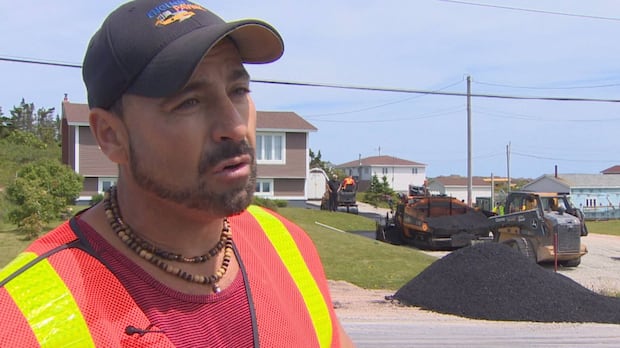Inflation beneath your tires: Paving companies feeling the pinch as fuel, asphalt costs rise
The effect of inflation is seeping into the pavement beneath your feet as sky-high diesel and asphalt prices drive up the cost of surfacing roads and parking lots.
One of the companies feeling the pinch in English's Paving, a Paradise-based company owned by Peter and Kim English.
Peter English knows how to make a point, and during a driveway paving job in Bay de Verde this week, he held up a shovel filled with hot mix asphalt and turned to the nearby CBC camera.
"That's $60 more a tonne this year than what it was last year, not counting the price of diesel. So it's hard to make a go of it," English said, raising his voice in order to be heard over the roar of trucks, a road roller and a small loader.
The most critical ingredients in road building and driveway paving are petroleum-based products, so with oil consistently trading above $100 US per barrel in recent months, it's not surprising that people like English have been hit hard by the trickle-down effects.
Last year, he was paying about $95 for a tonne of hot mix asphalt, and as low as 84 cents for a litre of diesel to fuel his fleet of trucks and other heavy equipment.
Now he's paying $150 for his asphalt, and as high as $2.64 for a litre of diesel.
"Let me make it as simple as possible to you. Right now this asphalt driveway I'm doing right here; last year the amount of asphalt probably would have cost me about $3,500. It's costing me $7,000 this year. Just for this one driveway," he said.
Fuel costs have nearly doubled
Turning to his trucks, English said his fuel costs have reached almost $30,000 weekly, nearly double what he was paying last year.
"Right now I'm just weathering the storm and I'm trying to cope with it. I'm trying to keep my prices as close as I can to last year. But at the end of the day this is just getting ridiculous," he said.
Peter English has been laying asphalt for three decades and has owned his own company for 10 years.
Companies like his, and his 10 employees, have a brief six-month window to make their profits, and then do their best to stay afloat during the lean winter months.
Paving is a business that requires planning through price quotes that can be done months in advance, so it's not as easy as jacking up the rates as costs increase, said English.
"If you look at [a customer] and say [it'll cost] another $1,500 for their driveway, they're going to say, 'No, we'll wait. We don't need it done.' A driveway is not a necessity. I got to either take it and swallow it, or lose the business," he said.
So English is having to squeeze in that extra driveway or two on most days, which means longer hours for his increasingly tired crew, in order to make up for the reduced margins.
"Right now, to date, my workers are making more money than what I'm making," he said.
The increased cost of asphalt, fuel and even in-ground infrastructure such as water and sewer pipes has also forced the provincial government and some municipalities to adjust their capital works plans.
Costs rising for provincial government
In a statement, a spokesperson for the Department of Transportation and Works said some bids on road and bridge construction were 25 per cent higher than pre-tender estimates because of higher oil and steel costs.
In addition, road construction contracts include a pricing adjustment for liquid asphalt and fuel that is tied to market indexes, the spokesperson wrote.
However, the provincial government is not cancelling or changing contract tenders, but is adding nearly $20 million to the 2022-23 roads plan, raising it to roughly $170 million.
Meanwhile, English keeps his order book full by taking it on the chin.
There's still plenty of pride to go around, however, after the blacktop is rolled to perfection, and his team inspects their work in Bay de Verde.
But there's little time for leisure.
"I gotta go, buddy. I gotta make some money," he said.



